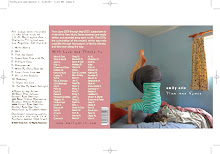Thursday, January 31, 2008
Montour Calls...
For two weeks in August, Hayley (my youngest sister - now studying architecture in Paris) and I ran the cafe while our mom took a long-deserved break to see friends and and family in Los Angeles. The long hours on our feet and constant interaction with employees and customers and washing dishes and shopping for food and being clueless all the while led us both to conclude this was the hardest work we’d ever done—harder than college, by far! Youthful energy and verve seemed a distant fantasy as we dozed off on the couch after work—ready for bed by 8PM.
The following is an excerpt from an email I sent to Hayley towards the end of September (three weeks after she left Montour Falls for her year in Paris). “Another day at the cafe is done. 13 hours. This included making approximately 9 or 10 pots of coffee in three varieties, scraping and cleaning piles of plates, smiling between the banter of Cyndi and Harry at the counter (both of whom inquire about you often and regularly--and say they miss you since they're stuck with me!). Smiling some more while asking Ray and Bob and Martin and Ron and June and Tom if they wanted their cups warmed up. Trying to stop smiling, but finding my face fixed in this gleeful expression. Listening to Chick offer suggestions for how to refine and improve our meatloaf special ("you gottahave a roll with it! and peas or corn. Yup that's right. You're alright. Yeah.") Tony Bennett has replaced Paul Simon in our music rotation. I had a brief affair with Elton John, but I grew tired of the circle of life. Made a cream of cauliflower soup that tastes and acts more like grits than a soup...so I put a special on the board "two eggs, cauliflower grits, and toast" .... but mom said that's false advertising--since it's not really grits. I could go on and on about the terrain of my day--and it would be very familiar to you. The fall color is just a hint on the hills.”
Thursday, January 24, 2008
Problem = Solution
"The prime directive of permaculture is making the decision to take responsibility for our own existence and that of our children's existence. Permaculture is different in each realization because it is specific to time and place, and therefore it can only every be a story particular to the people and settle in which it is experienced."
Permaculture systems:
- produce MORE energy than they use;
- provide basic needs for everything involved AND distribute a surplus;
- maintain a balance of health and productivity AND create new stores of it;
- recycle AND produce nutrients (don't pollute);
- produce needs within the system
From Wikipedia: "The word permaculture, coined by Australians Bill Mollison and David Holmgren during the 1970s, is a portmanteau of permanent agriculture as well as permanent culture. Through a series of publications, Mollison, Holmgren and their associates documented an approach to designing human settlements, in particular the development of perennial agricultural systems that mimic the structure and interrelationship found in natural ecologies.
Permaculture design principles extend from the position that "The only ethical decision is to take responsibility for our own existence and that of our children" (Mollison, 1990). The intent was that, by rapidly training individuals in a core set of design principles, those individuals could become designers of their own environments and able to build increasingly self-sufficient human settlements — ones that reduce society's reliance on industrial systems of production and distribution that Mollison identified as fundamentally and systematically destroying the earth's ecosystems."
Ethics: Earthcare (reverence and respect for all living things), People Care (providing needs--promoting self-reliance and community building), Fair Share (thinking beyond the self--distribution of surplus resources)
Attitudes:
- Problem=Solution
- Greatest Change for Least Effort
- Work with Nature, Not Against
- Unlimited Yield
- Everything Gardens
Principles: Energy (Sector Planning, Zone Planning, Elevation Planning, Network Planning), Resources (Value Feedback, Energy Recycling, Biological Resources, Multiple Functions-Redundancy), Design (Relative Location, Microclimate, Maximize Edge, Succession, Diversity, Pattern, Stacking, Limiting Factors)



